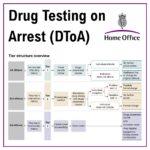Search Result
Metropolitan Police Service
Drug Testing on Arrest (DToA)
 The Drug Testing on Arrest (DToA) programme empowers the police to test individuals for any Class A drugs upon arrest or charge, aiming to identify drug misuse early and direct individuals toward treatment, thereby reducing drug-related crime. The DToA is outlined in the Drugs Act 2005, and changes in 2023 granted police the authority to test individuals in custody for any Class A drugs. The DToA isn’t new, it’s been around since 2003 though the response from forces in England and Wales was (then) mixed. In 2021 the government decided to increase funding with some forces now expanding their testing capabilities to address local drug-related issues.
The Drug Testing on Arrest (DToA) programme empowers the police to test individuals for any Class A drugs upon arrest or charge, aiming to identify drug misuse early and direct individuals toward treatment, thereby reducing drug-related crime. The DToA is outlined in the Drugs Act 2005, and changes in 2023 granted police the authority to test individuals in custody for any Class A drugs. The DToA isn’t new, it’s been around since 2003 though the response from forces in England and Wales was (then) mixed. In 2021 the government decided to increase funding with some forces now expanding their testing capabilities to address local drug-related issues.
Individuals aged 18 and over can be tested upon arrest. (Individuals aged 14 and over can be tested after being charged). A saliva swab is used to detect the presence of Class A drugs, primarily cocaine and heroin but new tests are being developed to expand this. The test is conducted in police custody suites. Refusal to provide a sample when required can lead to further legal consequences.
The primary goal of DToA is to identify drug use early in the criminal justice process. Individuals who test positive may be referred to appropriate treatment services to address their drug use. Testing is typically associated with specific offences known as "trigger offences" which are often linked to drug use. Authorised by an Inspector, or higher, testing can be conducted following any offence if drug involvement is suspected. According the Home Office’s own data, 117,825 reported tests were carried out between March 2022 to March 2024 of which 65,636 were positive (56%).
Drug testing is abusive, disproportionate, expensive and ineffective
"Release opposes the expansion of DTOA. Drug testing is abusive, disproportionate, expensive and ineffective. Testing is an invasive intrusion on people’s right to privacy, and incurs substantial personal costs in terms of time, problems with employment or family responsibilities and so on. As such it is clearly disproportionate."
Release’s response to the criminal justice bill 2023 - provisions on drug testing on arrestLittle information on whether treatment services will have capacity to accommodate the extra demand
"Similarly, the EM* and IA** provided very little information on whether treatment services will have capacity to accommodate the extra demand resulting from the policy. The IA only provided a vague statement that “there is cross-departmental collaboration with the Department for Levelling Up, Housing and Communities (DLUHC) and Department for Health and Social Care (DHSC) to ensure additional resources and funding can be allocated to reduce strain on drug treatment and other corresponding social services”. Even so, the IA warned there was a risk that the policy might lead to “longer waiting times” and “higher strain” on treatment services."
Will treatment programmes have capacity? | House of Lords, Parliament's Secondary Legislation Scrutiny Committee | July 2023
*Explanatory Memorandum | ** Impact Assessment
Criminal Justice (Specified Class A Drugs) Order 2023 (SI 2023/784) | House of Lords, Secondary Legislation Scrutiny Committee | Jul 2023
Summary: Drug Testing on Arrest (DToA) programme | GOV.UK | 2022
Swift, Certain, Tough: New consequences for drug possession | GOV.UK | July 2022
Data: Drug Testing on Arrest (DToA) programme (accessible) |
Drug interventions programme (DIP) | Home Office | 2011
Drug Testing on Arrest | Hampshire PCC | 10 Aug 2023 | 1m 33s
Police & Crime Commissioner for Hampshire and the Isle of Wight, Donna Jones, talks to Police Inspector John Smith at the Portsmouth Investigation Centre about the new drug testing on arrest scheme taking place in the custody suites across the two counties.

